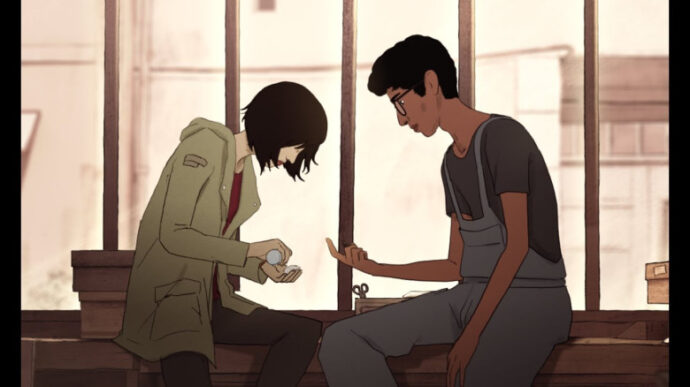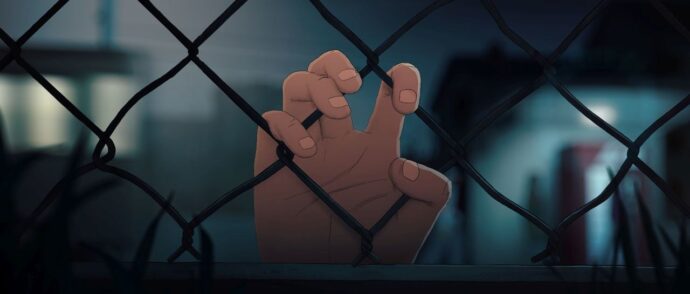This is part 3 of a series titled The French Connection. This series looks at French art and culture introduced to Philadelphia. Through analyzing the art itself, its significance to France, and even its potential crossover with Philly culture, this will be an exploration on how French art can truly impact and engage U.S. viewers.
French animation has literally existed since the beginning. The 1908 short film Fantasmagorie, directed by Emile Cohl, is considered by many historians as the first animated film, at least when it comes to the traditional methods people use today.
This has led to a rich history of classic features. The stop-motion The Tale of the Fox was France’s first animated feature, pre-dating Snow White‘s release. The King and the Mockingbird released in 1980 after 32 years of development to high acclaim. Nowadays, French animation is a mainstay in the Oscar’s Best Animated Feature category. Such examples include The Triplets of Belleville, Persepolis, and most recently last year’s I Lost My Body.
One part romance, another existential, with a supernatural twist inbetween, this animated film won the Grand Prize in the International Critics’ Week section of last year’s Cannes. And considering its creative premise, beautiful designs, and melancholic atmosphere, it’s easy to see why.
Note: I Lost My Body has an English dub available, featuring Dev Patel and Alia Shawkat in the cast. However, this review is on the original French dub.
The Hand
Half of the film feels like any indie romance. Two young lovers. Unsure about how they fit into the world. One of them tries to get the other’s attention. Conflicts and tensions emerge. Simple stuff.
The other half of the movie focuses on a severed hand. Yes really. The film opens with lead Naoufel (Hakim Faris) lying on the ground with his hand cut free, a pool of blood below him. How this happened isn’t explained, as it then cuts to the hand breaking free from its refrigerator prison, complete with a mind of its own. Think Thing from The Addams Family. As it escapes the hospital and roams the streets of France, it wanders aimlessly, trying to find its way back to its body.
Between the severed hand’s escapades, the film cuts to flashbacks of Naoufel, and his life before the incident, much of which from the hand’s perspective. His happy childhood, depicted in grayscale, is cut short from a tragic car crash, killing his parents. Now, he lives with his distant uncle and crude cousin. He’s the worst pizza delivery boy in France. He has no goal or passion, and withdraws himself from the rest of the world.
The film connects the hand and Naoufel very well, creating a great parallel, but also very strong contrast between the two. The hand is lost, wandering aimlessly through the city. However, he has a set goal, stopping at nothing to achieve it. Naoufel is aimless, with no sense of direction on where to take his life. Yet he doesn’t have any goal to make his life better.
This helps both stories feel complementary. The severed hand isn’t a cheap gimmick, but an enhancement to the themes and arcs of the story. Watching the hand crawl is richly entertaining. Despite its macabre appearance, it’s very sympathetic, and you grow an attachment to the body part. Several sequences where he finds himself battling rats or pigeons are also very intense, with dynamic composition and editing.
The Body
Naoufel’s story is certainly a compelling one. His tragic past, coupled with his struggles with connecting to others, is believable, and pitiful. The beginning, showing his young life in greyscale, shows his qualities, helping him become more likable.
It ties into a lot of existential ideals that bring a lot of depth to the lead’s struggle. Screenwriter Guillame Laurant plays around and subverts the flaneur concept to great effect. Naoufel has lost his purpose, wondering whether there is a purpose to still being here or not. Also helped by the film’s dreamlike atmosphere and Dan Levy’s gorgeous score, it becomes easy to invest in Naoufel’s issues.

The drawback towards his story is the actual romance itself. Naoufel stumbles upon a woman named Gabrielle (Victoire Du Bouis), and tries to come closer to her by working for her uncle in an attempt to become closer to her. It’s not uninteresting, and I appreciate how the film calls out some of the stalker behavior Naoufel takes part in. Yet Naoufel and Gabrielle’s relationship could have been more memorable, and the chemistry doesn’t feel as strong as it should be. Of course, that could be considered an intentional play.
The Look
Using rotoscope and traditional animation, the film really pops. Some stilted movements aside, the style is memorable and detailed, looking almost like a graphic novel. Character designs are realistic, with just a hint of exaggeration, and the backgrounds can be gorgeous at points.
Yet the star of the show, once again, is the hand. Newcomer director Jeremy Clapin has great understanding on how to give something with no face so much personality. It can be unnerving at points to see it crawl, but there’s still something oddly human in his movements and mannerisms that still make it work and make his journey a compelling one for viewers. Clapin also has great fun having the hand interact with the city, whether it be dramatic, frightening, or heartwarming.
The French-US Connection
There’s a lot a Philadelphia audience can take in here. For starters, the appeal of a dramatic, adult animated feature. It’s still uncommon to see adult animation in the US push towards serious work. And while not rare in France, such material isn’t done often over there.
Of course, outside of being a rare beast in animation, the themes of loneliness and aimlessness are still resonant today. We’re all lost at some point. We’re all unsure about the future. We all go through tragedy. That feeling of aimlessness and uncertainty in ourselves is going to happen, and Clapin knows how these feelings cultivate.
At the same time, while not the most hopeful of movies, there’s enough here to help people keep going. They can relate to Naoufel’s struggles, while also embrace the hand’s determination, as it wanders with a purpose and a drive. And in those last few minutes, while still somewhat sour, leaves on enough of a good note that ties into both Naoufel and his hand’s stories.
To Sum Up…
I Lost My Body combines dramatic storytelling, with dreamlike pacing, and a macabre protagonist to solid effect. Not everything works, but this is a film that is too original to not at least appreciate, and it’s wonderful to see French animation continue to innovate and inspire.
